Page 101 of 352 pages « First < 99 100 101 102 103 > Last »
Muster rolls and articles of agreement
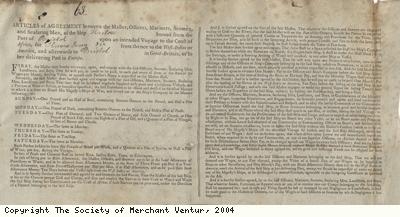
Description:
From ledger of ships’ muster roll, 29th September 1793 – 29th September 1794; Society of Merchant Venturers’ archive.
Muster rolls for the ship, the Hector .
The Hector left Bristol in 1792, bound for Bonny in West Africa, for slaves, ivory, etc .
The captain bought over 500 slaves for sale in St Vincent. Reports suggest that either 26 or 41 died on the voyage.
The muster roll is a list of all crew signed on for all or part of a voyage, which was used to calculate the money each man should pay to the Sailors Hospital Fund (insurance).
Articles of agreement set out the terms and conditions of a voyage. The Articles was a standard printed form, listing the food rations and financial arrangements the crew would receive.
The Society of Merchant Venturers is a Bristol-based organisation, which was formed in 1552 as an elite body of merchants involved in overseas trade. The Society still exists today.
Date: 1792
Copyright: Copyright The Society of Merchant Venturers
Muster roll for the ship, the Hector
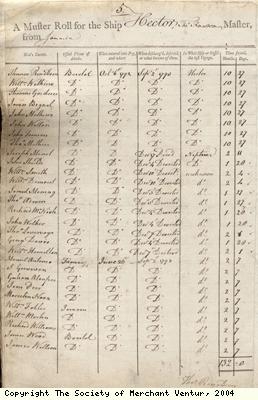
Description:
From ledger of ships’ muster roll, 29th September 1793 – 29th September 1794; Society of Merchant Venturers’ archive.
Muster roll for the ship, the Hector, from Jamaica, 1793.
This muster roll covers the last leg, back to Bristol, and the date is that of leaving the Caribbean.
The muster roll is a list of all crew signed on for all or part of a voyage, which was used to calculate the money each man should pay to the Sailors Hospital Fund (insurance).
The Society of Merchant Venturers is a Bristol-based organisation, which was formed in 1552 as an elite body of merchants involved in overseas trade. The Society still exists today.
Date: 1793
Copyright: Copyright The Society of Merchant Venturers
Muster roll
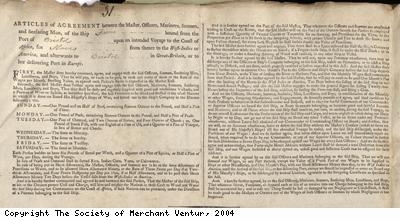
Description:
From ledger of ships’ muster roll, 29th September 1793 – 29th September 1794; Society of Merchant Venturers’ archive.
Muster roll for the ship, the Fame , 1792 .
The Fame sailed for Old Calabar in West Africa in 1792, shipping 201 enslaved Africans to Grenada. Between 65 – 72 died on the voyage and the master felt that there was never a worse cargo of slaves shipped from Africa .The agents who sold them reported that there is not…one good slave in the ship .
The muster roll is a list of all crew signed on for all or part of a voyage, which was used to calculate the money each man should pay to the Sailors Hospital Fund (insurance).
The Society of Merchant Venturers is a Bristol-based organisation, which was formed in 1552 as an elite body of merchants involved in overseas trade. The Society still exists today.
Date: 1792
Copyright: Copyright The Society of Merchant Venturers
Custom house accounts
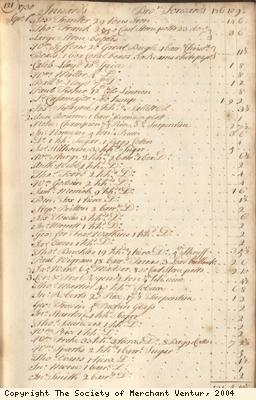
Description:
Custom house accounts for wharfage payments, 1730.
William Jefferies imported a cargo of great bugle beads, coral beads and other glass beads. These were probably intended for the trade cargo of a slaving voyage. Coral beads were especially prized in Benin, in West Africa.
The Society of Merchant Venturers is a Bristol-based organisation, which was formed in 1552 as an elite body of merchants involved in overseas trade. The Society still exists today.
Date: 1730
Copyright: Copyright The Society of Merchant Venturers
Custom house accounts
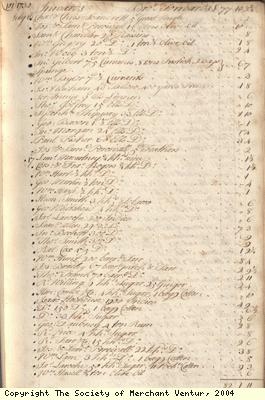
Description:
Custom house accounts for wharfage payments, 1730.
Charles and Christopher Scandrett imported a cargo of great bugle beads. These may have been intended for the trade goods of a slaving voyage.
The Society of Merchant Venturers is a Bristol-based organisation, which was formed in 1552 as an elite body of merchants involved in overseas trade. The Society still exists today.
Date: 1730
Copyright: Copyright The Society of Merchant Venturers
Custom house accounts
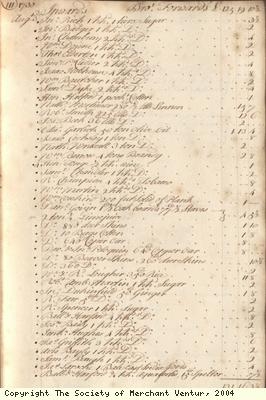
Description:
Custom house accounts for wharfage payments, 1730.
James Laroche, a slave trader, imported one bale of East India goods, that is Indian cotton cloths. Indian textiles made up a large part of any trade cargo for a slaving voyage.
The Society of Merchant Venturers is a Bristol-based organisation, which was formed in 1552 as an elite body of merchants involved in overseas trade. The Society still exists today.
Date: 1730
Copyright: Copyright The Society of Merchant Venturers
Custom house accounts
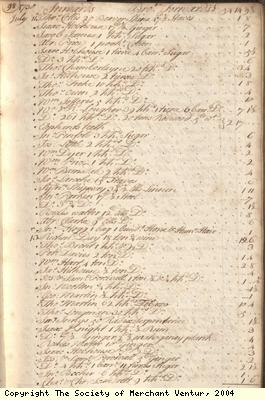
Description:
Custom house accounts for wharfage payments, 1730.
Walter and Richard Lougher imported 261 hogsheads of sugar, 20 tons of redwood and 5 cwt of ivory, paying £2.17 duty. Tropical hardwoods and ivory were often bought along with slaves in Africa, and came to Bristol via the Americas, where the slaves were sold and sugar bought.
The Society of Merchant Venturers is a Bristol-based organisation, which was formed in 1552 as an elite body of merchants involved in overseas trade. The Society still exists today.
Date: 1730
Copyright: Copyright The Society of Merchant Venturers
Custom house accounts book
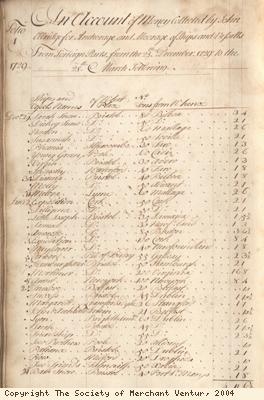
Description:
Custom house accounts book for Anchorage and Moorage payments, 1729 – 1730.
Ships paid a fee for mooring at the dockside. Ships on this page include the Little Joseph from Jamaica, the Mortimer from Virginia, the Acent from New York and the Amoretto from Boston.
The Society of Merchant Venturers is a Bristol-based organisation, which was formed in 1552 as an elite body of merchants involved in overseas trade. The Society still exists today.
Date: 1729 - 1730
Copyright: Copyright The Society of Merchant Venturers
Custom house accounts
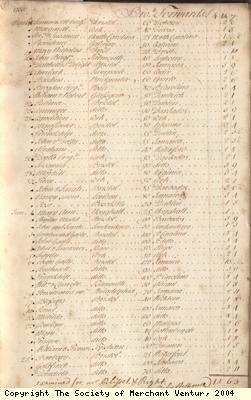
Description:
Custom house accounts for Anchorage and Moorage payments, 1730.
On this page, ships are noted from North Carolina, Jamaica, South Carolina, Barbados and Virginia.
The Society of Merchant Venturers is a Bristol-based organisation, which was formed in 1552 as an elite body of merchants involved in overseas trade. The Society still exists today.
Date: 1730
Copyright: Copyright The Society of Merchant Venturers
Custom house accounts book
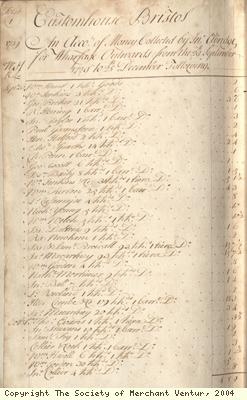
Description:
Custom house accounts book for wharfage payments, 1729 – 1730.
Wharfage was a duty payable on all goods imported and exported. Goods outwards (exports) are listed simply as goods . Imports include wine, tobacco, sugar, cotton, ginger, ivory (elephants’ teeth), molasses and aloes. Each barrel or bale was subject to a tax.
The Society of Merchant Venturers is a Bristol-based organisation, which was formed in 1552 as an elite body of merchants involved in overseas trade. The Society still exists today.
Date: 1729 - 1730
Copyright: Copyright The Society of Merchant Venturers

